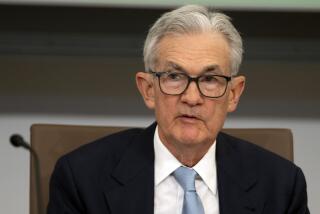Fed Chief Says Oil, Gas Outlook May Curb Use
- Share via
WASHINGTON — Federal Reserve Chairman Alan Greenspan said Tuesday that the likelihood of persistently high energy prices would help check U.S. energy use and lead businesses to rethink energy-related investment decisions.
“The rise in six-year oil and [natural] gas futures prices is almost surely going to affect the growth of oil and gas consumption in the United States,” Greenspan said at a conference on energy security sponsored by the Center for Strategic and International Studies in Washington.
He did not address the immediate outlook for the U.S. economy or interest rates.
The Fed chief said the “dramatic rise” in oil and natural gas futures prices in recent years carried the potential to “significantly affect the long-term path of the U.S. economy.”
Greenspan said that because prices had risen sharply for the delivery of oil and natural gas six years out, such elevated prices probably would be the norm.
“Six years is a period long enough to seek, discover, drill and lift oil and gas, and hence futures prices at that horizon can be viewed as effective long-term prices,” he said.
“The recent [price] shift ... has been substantial enough and persistent enough to influence business investment decisions, especially for facilities that require large quantities of natural gas,” Greenspan added.
“Although the effect of these developments on energy-related investments is significant, it doubtless will fall far short of the large changes in our capital stock that followed the 1970s surge in crude oil prices,” he said, noting that the U.S. economy had grown much less energy dependent.
Greenspan said high oil prices presumably reflected concerns over the potential for long-term supply disruptions in the Middle East, and that market forces were as important a determinant of prices as the Organization of the Petroleum Exporting Countries.
“Although OPEC production quotas have been a significant factor in price determination for a third of a century, the story since 1973 has been as much one of the power of markets as of power over markets,” he said.
“The signals provided by market prices have eventually resolved even the most seemingly insurmountable difficulties of inadequate domestic supply in the United States.”
More to Read
Inside the business of entertainment
The Wide Shot brings you news, analysis and insights on everything from streaming wars to production — and what it all means for the future.
You may occasionally receive promotional content from the Los Angeles Times.










